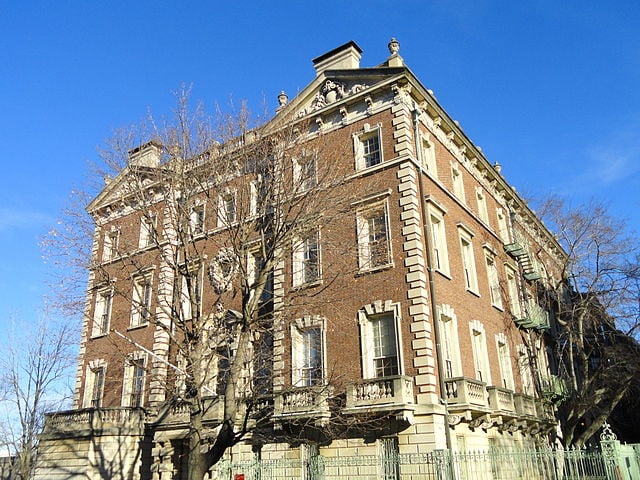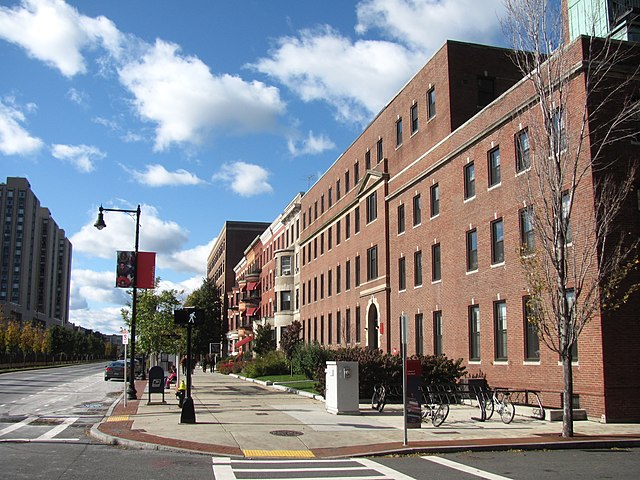If part of what a student is looking for out of their university experience is to truly become an expert on a wide array of subject matters, then Boston University may be an ideal choice.
Located in what many consider to be the best city in the US for university students, BU was described by the Times Higher Education rankings as an “international powerhouse” thanks to BU’s global contribution to rigorous research.
Furthermore, grade inflation is far from a problem at Boston University. They guarantee that their rigorous coursework will push students to know the material inside and out.
According to CBS, Boston University is one of the 16 most academically rigorous universities in the nation, based on how difficult it is to receive an A letter grade.
Boston University beat out Harvard, Yale, Stanford, and more in finding its place in CBS’s ranking.
So, if a student is up for a challenge, Boston University is sure to provide one.
BU’s status as an international powerhouse is furthered by the large proportion of international students who go there.
With 21% of the student population being international students, BU is the university with the 5th largest proportion of international students per class.
As such, Boston University, and its alumni, are truly game-changers all over the world. BU graduates are disciplined thinkers, hard workers, and dedicated scholars that know their subject matters inside and out.
With 8 Nobel Laureates, 23 Pulitzer Prize winners, 10 Rhodes Scholars, 6 Marshall Scholars, 9 Academy Award winners, and several Emmy and Tony Award winners, BU graduates demonstrate excellence in every academic discipline.
With former BU faculty and students including Martin Luther King Jr., Alexander Graham Bell, and Alexandria Ocasio-Cortez, the excellence of BU’s academics regularly inspire the world’s changemakers.
In fact, the first African-American Woman, Rebecca Lee Crumpler, and the first Native American, Charles Eastman, to be certified as doctors in the US studied at Boston University. And Helen Magill White was the first woman to receive a PhD in the US—and she received her PhD from BU.
But all of this excellence, naturally, means that getting into BU is no simple task.
So if you are interested in joining that cohort of elite students, you can do one simple thing to increase your chances of acceptance: utilize the early decision application deadline.
As such, this article breaks down the ins and outs of BU’s early decision application: deadlines, acceptance rates, deferral rates, and everything else you need to know to ensure you can best make use of BU’s early decision application and increase your chances of attending this wonderful and historic university.
Boston University Early Decision Acceptance Rate

The early decision acceptance rate at BU is around 33%.
This will put students at a significant advantage when compared to non-early decision applicants.
For those who do not take advantage of the early decision application, the acceptance rate at Boston University sits around 20%.
According to Boston University, early decision applicants should be those students who are confident that Boston University is their top choice.
This is part of the reason those who apply using the early decisions option have a higher acceptance rate than those who do not.
To Boston University, applying early-decision indicates to them that you are enthusiastic about being a BU student and that their offer of admission is sure to bring you to BU, as opposed to you attending another institution.
Boston University Early Decision Decision Date
Early decision applicants will hear back from BU admissions no later than December 15th.
On the Coalition and Common applications, selecting BU as one’s early decision application is binding.
As such, if one takes advantage of the early decision application, you will be required to accept their enrollment at Boston University lest their admissions decision be revoked.
Notably, the date at which students hear back regarding an admissions decision is different from when students hear back regarding financial aid.
Although many universities pair financial aid with an admissions decision, early decision applicants can expect to hear back regarding financial aid sometime around early April.
Boston University Early Decision Deadline

The early decision deadline for Boston University is November 1st. This is also when one’s CSS and FAFSA must be submitted.
After hearing back regarding one’s admissions decision around mid-December, early decision applicants will have until mid-January to submit their enrollment deposit.
The date by which one must accept their offer of admission and submit their enrollment deposit is particularly important to keep in mind for early decision applicants.
Early decision admittance is binding, and thus not enrolling by the stated date would cause BU to revoke the offer of admission.
As well, it is essential to note that the early decision application is only available to high school seniors applying for September admission. There is no spring term or summer term early decision application.
Does Boston University Have Early Decision 2?
Boston University does have an early decision 2 application deadline of January 4th.
Although this is the same application deadline as those applying for regular admission, one can still mark their application as “Early Decision” in order to be considered an early decision 2 applicant.
Although BU does not provide statistics specifically regarding the acceptance rates for early decision 2 applicants, there is some evidence to suggest a significantly lower acceptance rate for early decision 2 applicants compared to early decision 1.
An article in the Daily Free Press from 2017 received information that BU wished to have 1,190 early decision students in total, with 916 of those being from the early decision 1 application pool.
They reported that about 2,000 students applied for early decision 2 to fill those remaining 274 spots, suggesting an acceptance rate for early decision 2 applicants of around 13%.
Although BU does not verify these figures, it is important to keep in mind how early decision 2 might not aid students in standing out from the competition to the same degree as early decision 1.
Boston University ED Deferral Rate

Students can expect a deferral rate at Boston University of roughly 42%.
Although there is limited data from recent years regarding the rate at which Boston University defers early decision applicants, this figure, from 2004, should nevertheless still be somewhat close to what the deferral rate sits at today.
Being deferred from Boston University as an early decision applicant means that one has been denied early admission and will be judged alongside those students who applied for the standard admissions deadline.
If this occurs, one will then have a roughly 20% likelihood of being admitted to BU—the same acceptance rate as those who applied for regular admission.
Suppose a student has been deferred from an early decision at BU university. In that case, they will hear back regarding this decision in mid-December when acceptance and rejection letters are sent out to early decision applicants.
After hearing about whether or not one has been deferred, they should expect to wait several months before hearing back regarding whether they have been accepted into BU alongside those admitted from the pool of regular decision applicants.
If one has been accepted into BU after being deferred, they will hear back regarding this decision by late March.
How to Apply to Boston University for Early Decision
There are two ways to apply for early decision at BU: one through the Common Application and another through the Coalition Application.
On the Common Application, while filling out the BU section of the application, there should be a question that prompts students to answer whether or not they are interested in applying Early Decision.
This section of the BU application will explain the binding nature of early decision. If one is accepted through early decision, they must attend BU lest their offer of admission be revoked entirely.
At the bottom of this webpage, students will find an area where themselves, a parent/guardian, and a school counselor all must sign that they acknowledge early decision’s binding nature.
With all three of these signatures added to the early decision section of the Common Application, students then must submit their application prior to November 1st—or January 4th for early decision 2—in order to be considered for early decision.
On the Coalition Application, there will be a section entitled “Term.” Within the Term section, look for the subsection entitled “Decision Plan.”
Selecting “Early Decision” within the decision plan section will then cause the application to download the Early Decision agreement.
Like with the Common Application, this agreement must be signed by the applicant, a parent/guardian, and a school counselor.
Then, students will be able to re-upload the signed document into the Term section of the Coalition Application.
And once this is done, and all the requirements for early decision have been met, then all students need to do is wait for the admissions decisions to come out in either mid-December or mid-February.
With that coveted acceptance letter in hand, students can begin their journey towards a university that has, and will continue, to change the landscape of history thanks to the many amazing faculty, staff, and students who are abundantly proud to call themselves Terriers.














